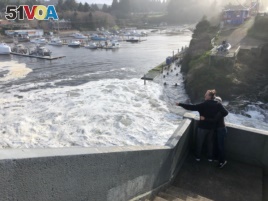18 February 2020
Vacationers, nature lovers and other people are using their cameras to document the effects of extreme high tides. By doing so, these men and women are helping scientists predict what rising sea levels will mean for coastal communities around the world.
The volunteer photographers are taking pictures of an unusually high tide: the king tide.

In this Jan. 11, 2020 photo residents watch as an extreme high tide rolls in and floods parts of the harbor in Depoe Bay, Oregon, USA. (AP Photo/Gillian Flaccus)
King tides take place about two times a year in coastal areas when the sun and Earth's moon align. The alignment increases the gravitational pull that produces the normal rising and falling of the sea.
The volunteers' goal is to capture how high the waterline gets and where all the water goes. The volunteers then upload the images for use by scientists, policymakers and even city planners.
The pictures show where flooding affects some roads, and offer clues as to whether it is safe to build new housing.
The first of these King Tide Projects involving the public began in 2009 in Australia. The idea has since spread to coastal areas in the United States, Canada, New Zealand, Mauritius and other nations.
Flooding from king tides helps to show how rising sea levels will affect coastal communities, said Peter Ruggiero, acting chief of the Oregon Climate Change Research Institute. He added that warmer ocean water and bigger storms could make those changes more intense.
Skip Stiles is the executive director of a not-for-profit group called Wetlands Watch. It helped organize 700 people to document a king tide in the U.S. city of Norfolk, Virginia in 2017.
"For us, the king tide offers a look at where the water will be in about 2050," about 30 to 46 centimeters above normal levels, Stiles said.
His group's efforts have since grown into a computer software program that uses crowdsourcing to gather images and find flooding.
"What we're finding is there's a real appetite for this data," he said.
Some of the King Tide Projects are operating under the direction of nonprofit groups, while others work with state and local governments. They all have the same goal: to educate the public and provide a clear example of how climate change will affect everyday life.
Marina Psaros helped develop California's King Tides Project.
"A lot of the conversation around climate change was what was happening far away and not about what people were going to be experiencing in their own lives," she said. "The goal of the project was to get people thinking more about climate change locally instead of just polar bears."
When Auckland, New Zealand, organized its first king tide photo event, people shared pictures of flooded areas and roads with local government officials. Some of the images were used to develop a plan to build up a popular beach that was slowly being washed away.
Last year, the group expanded the program to include a series of tide gauges that citizen scientists inspected, said Ben Sheeran, founder of the New Zealand King Tide Project.
"There's no eureka moment where it all comes into play, but it's an evolving database of information that's there when needed," he said.
I'm John Russell.
Gillian Flaccus reported on this story for the Associated Press. John Russell adapted the report for VOA Learning English. George Grow was the editor.
We want to hear from you. Write to us in the Comments Section.
__________________________________________________________
Words in This Story
align – v. to organize things so that they form a line or are in a correct position
gravitation – n. technical : the natural force that causes things to fall towards the earth
upload – v. computers : to move or copy (a file or program) from a computer or device to a usually larger computer or computer network
clue – n. a piece of evidence; information used to solve a mystery
crowdsourcing – n. the act or process of obtaining information from a large number of people (usually on the internet)
appetite – n. hunger
conversation – n. oral exchange of observations, opinions, or ideas
gauge – n. an instrument used to measure something
eureka – interjection. used to express surprise or excitement when a discovery has been made